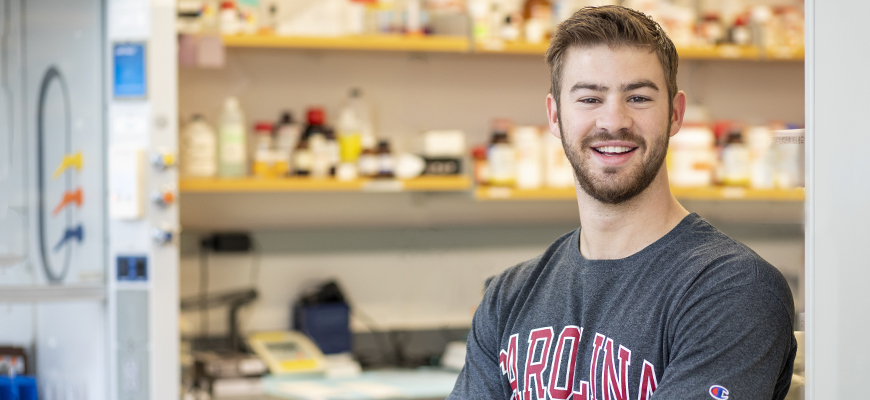
Psychology major finds his passion through research
Jeremy LaPointe discovered his interest in neuroscience through lab work
Posted on: May 28, 2020; Updated on: May 28, 2020
By Page Ivey, pivey@mailbox.sc.edu, 803-777-3085
Jeremy LaPointe has been interested in learning more about why people behave in certain ways since he was in high school. He has been able to pursue that interest at the University of South Carolina in the classroom and in research labs as an undergraduate majoring in experimental psychology with a minor in neuroscience.
“I think neuroscience delves into the brain a little more where some psychology labs just kind of record the behavior and what happens. I like that neuroscience aspect where you’re actually looking at the brain and the anatomy of what’s going on,” says LaPointe, a member of the South Carolina Honors College.
Not all of his research experience has been psychology-specific — his first lab work came during his freshman year and was a sociology lab examining the impact of physical activity in afterschool settings. In his sophomore year, he joined a lab that was focused on HIV research.
“I actually learned a lot about what I want to study through research experience,” LaPointe says. “In this lab, we study HIV, which I am not necessarily interested in as a field of study, but I’ve learned skills that I can apply to other fields in the future.”
With support from National Fellowships and Scholar Programs advisers, LaPointe won a prestigious Goldwater Scholarship for his research during his junior year. He has maintained a 4.0 during his time at UofSC and says he found himself becoming very ambitious while he was here.
“Whether that’s joining three labs in four years, doing several projects in those labs and learning those skills, or having a 4.0 still, it’s that drive to do well in the classroom and trying to do as much as possible on campus,” he says..
I actually learned a lot about what I want to study through research experience.
Jeremy LaPointe, senior psychology major with neuroscience minor
As he prepares to graduate in May, LaPointe knows he wants to study the neuroscience of language. He is currently working in a lab that tests the effects of stimulation to the anterior temporal lobe of the brain.
“I think there’s a lot of cognitive power in language, in terms of how people think, how they make memories and recall those memories, how they make decisions,” he says.
After graduation, LaPointe plans to take a year or two off from his studies to teach and travel, most likely in China, but definitely in Asia.
“I went to Thailand to study abroad and it was addicting,” he says, adding that he is weighing offers through a program called Teaching Nomad to teach English as a second language.
He also has participated in several leadership programs on campus that involved tutoring or mentoring students, including serving as a supplemental instruction peer leader for psychology 101 class.
“With that I have learned that I have an interest in teaching and I want to capitalize on that while I am young to go abroad,” LaPointe says.
During his study abroad, he ventured into neighboring countries and even did a monthlong solo tour of New Zealand, trying new outdoor activities including surfing and skydiving.
LaPointe says access to outdoor activities is important to him as he looks at graduate schools for the next step on his path to becoming a college professor and researcher. The Fort Mill, S.C., native grew up going to the U.S. National Whitewater Center in Charlotte, N.C.
“I just kind of grew up there,” says LaPointe, who also worked as a guide for the center. “It was fun to grow up with that in my backyard. And someone is always there to watch you and keep you safe.”
Learn more
Students interested in applying for research scholarships should contact National Fellowships and Scholar Programs.